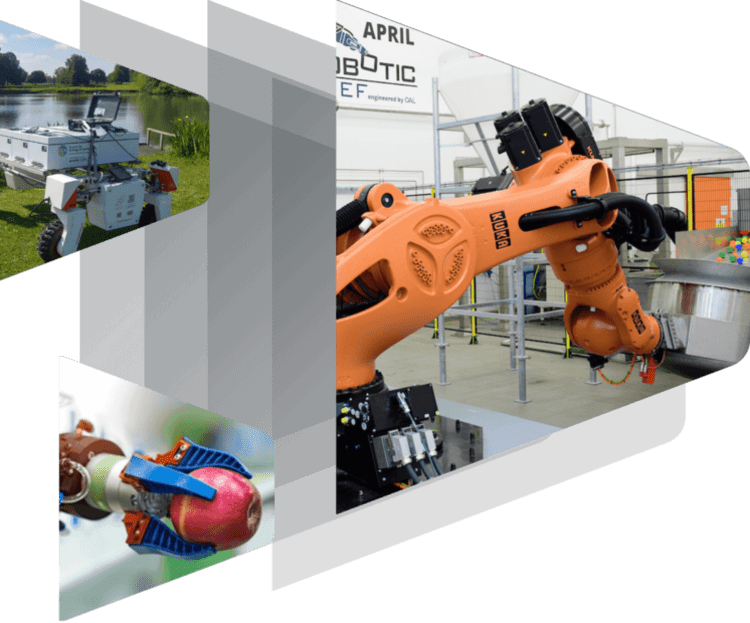Find out more
about support for investing businesses from Invest Lincolnshire

1st Image
Artificial Intelligence (AI) leverages computers and machines to mimic human problem-solving and decision-making capabilities (IBM). Through intelligent robotics, AI is applied to business challenges in the physical world. Lincolnshire’s leadership in both AI and intelligent robotics has its roots in a fortuitous combination of regional industries with similar needs, including food production, manufacturing and distribution; defence and security; energy and power systems; process industries; and logistics. Each of these sectors has a requirement for digitalisation and automation solutions - to deliver improved performance, productivity and sustainability, or to address labour constraints.
As a major UK agrifood centre, Lincolnshire is an established leader in agri-tech robotics, with automation expertise extending from agriculture into food manufacturing, warehousing and logistics. Based on a historic and ongoing RAF presence, Lincolnshire has emerged as the ‘UK’s ISTAR hub’, with advanced digital, IT and electronics businesses supporting the military. Lincolnshire’s wider industrial base includes advanced engineering, energy and power systems companies applying Industry 4.0 technologies to digitalise and automate their operations. Supported by collaborations between regional businesses and academia, these industrial strengths have helped to establish Lincolnshire as a leading centre for AI, intelligent robotics, and Industry 4.0 research and innovation.
Based on a unique nexus of digital tech and advanced engineering knowledge and expertise, and through wide-ranging industrial collaborations, the University of Lincoln has emerged as a UK centre of excellence for cross-sector AI, intelligent robotics and Industry 4.0 R&D. The university’s dedicated research centres and groups apply technologies including AI, machine learning, big data analytics, sensors, and robotics and automation to transform business and supply chain productivity, efficiency and sustainability, and to enable advanced product development.
The University of Lincoln’s AI and intelligent robotics research centres and groups include:
The Lincoln Centre for Autonomous Systems (L-CAS): a nationally recognised, cross-disciplinary centre for robotics research, bringing together academics and companies from sectors including agrifood, agri-tech, logistics, nuclear, space and healthcare.
2nd image
The Lincoln Institute for Agri-Food Technology (LIAT): a multi-disciplinary, sector-leading centre of expertise in AI, robotics, engineering, crop science, environmental sustainability, food manufacturing, product development and supply chains. Robotics and automation projects include robotic phenotyping, collaborative robots in the food industry, selective harvesting and weeding robots, novel sensing systems, and real time data analysis for crop care.
The Industrial Digitalisation and System Intelligence Research Group: developing and testing innovative solutions focused on industrial AI, robotics and automated systems, communications, networks and embedded systems, through strong collaborations with international research partners and end users in the automotive, aerospace, space, energy, telecommunication, IT, agrifood and healthcare sectors.
The EPSRC Centre for Doctoral Training in Agri-Food Robotics (AgriFoRwArdS): a collaboration between the universities of Lincoln, Cambridge and East Anglia focused on robotics within the agricultural sector. The Centre provides fully funded opportunities for students to undertake MSc and PhD study, to become the next leaders in the agrifood robotics community.
Collaborations between the University of Lincoln and industry, across established and new sectors, have included:
High-productivity agri-tech: To solve the problem of a limited labour force, the agri-tech sector has developed intelligent robots to plant, weed and harvest crops. Companies including Thorvald have benefitted from close collaboration with the University of Lincoln on R&D including access to open-source robotics software.
Food manufacturing robotics and automation: The University of Lincoln’s National Centre for Food Manufacturing works closely with the food manufacturing sector to improve productivity, traceability and sustainability throughout the supply chain.
Warehouse logistics: The Lincoln Centre for Autonomous Systems (L-CAS) has collaborated with companies including Hikrobot to automate warehouse processes, bringing improved accuracy, productivity and traceability.
Defence & security: Lincolnshire is a UK centre of excellence for defence and security technologies. Industry and academia have collaborated closely in areas including ISTAR, AI and robotics, including RCVs for hostile environments.
Power and Energy systems: Companies including myenergi, specialising in the optimisation and automation of power and energy systems, have collaborated with the University of Lincoln to develop safe, sustainable, cost efficient solutions.
Healthcare Assistive Robotics: This new sector is well-placed to benefit from Lincolnshire’s transferable expertise in AI and intelligent robotics, with established collaborations between businesses and academia in the rapidly growing fields of digital healthcare and assistive robotics.
Potential benefits for businesses investing in Lincolnshire include access to leading-edge transferable research, knowledge and expertise; access to testbed facilities; well-established routes to collaboration; a wide range of experienced potential supply chain partners; and access to government investment.
Lincolnshire’s sector-focused Business Location Guides provide essential information and data for companies researching and evaluating Lincolnshire as a potential investment location. Insights include: